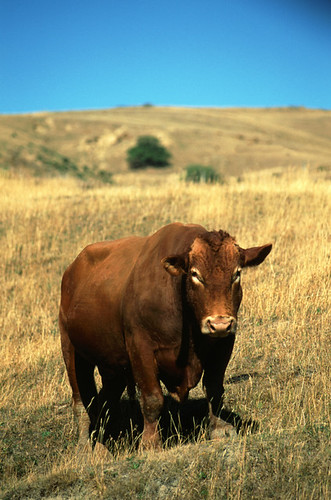Drought challenges all aspects of agriculture
Posted on Aug 29, 2012One of the greatest attributes of a general farm organization such as Farm Bureau is that it represents farm and ranch families who raise all different types of food and fiber. At the same time, one of the biggest challenges facing a general farm organization is that it represents farm and ranch families who raise all different types of food and fiber. This summer’s drought brought that fact clearly into focus.
For the third time in four years, corn prices have topped $7 a bushel. This year, the price has shot past $8. Livestock farmers and ranchers are painfully seeing their revenues melt due to lack of forage supplies and high feed costs. Compounding their pain are low prices in the short term due to more animals going to market so they do not have to be fed.
Feeling tremendous economic pressure, livestock producers are calling for relief. One highly visible target is our nation’s Renewable Fuels Standard. Many are calling for a waiver. In addition to the drought itself, they blame the government’s renewable fuels mandate for higher feed costs. If Farm Bureau just represented cattle, hog or poultry growers, it would be pretty easy to determine our position. Similarly, if all of our members grew only corn, our position would be steadfast.American agriculture is a big tent. Farm Bureau policy supports livestock producers. It also supports expanding renewable fuels to the maximum amount possible. Therein lies the rub.
So, how does a general farm organization reconcile these two positions, which are both held as fundamental and vital, in a year like this?
The simple answer is with great difficulty and a lot of conversation. But the complexities of this issue trump simple logic. The economics behind renewable fuels reflect a new reality that goes well beyond the mandate. At today’s energy and livestock prices, a bushel of corn is simply worth more passed through a vehicle’s tail pipe than it is passed through a chicken or a hog’s stomach. In fact, one can make a strong case that a bushel of corn is worth close to $10 per bushel by extracting all the energy and leaving the protein for an animal feed.
Nearly the entire petroleum refining industry is set up to refine oil to 84 octane content, with ethanol added to boost it to 87 octane. It is actually cheaper for the refining system to produce 87 octane gasoline using ethanol than it is to refine oil to a full 87 octane.It took the RFS mandate to convince the oil companies of that fact. It is fairly certain that oil companies would revert to a full oil-based fuel—and raise the price of gasoline—if the renewable mandate were removed.
Further, with oil in the $80-$90 per barrel range, one recent study suggested that waiving the RFS in the short-term would only lower the price of corn by roughly 25 cents. Another suggested that corn prices next year would be affected anywhere between nothing and $1.30 per bushel.
What we are really facing is a problem of low grain stocks and of holding enough reserves to get through this temporary situation. Let me be emphatically clear on this point: re-creating a government stocks program does not work for any sector of production agriculture. History shows that significant price swings are a natural part of the marketing cycle—even before ethanol and exports were players in the agricultural sector. One must go back to the 1930s to find the last time we had a severe drought but did not have the dead weight of government stocks hanging over the market. And we saw price swings then very similar to what we are witnessing today.
As farmers and ranchers, whether a producer of crops or livestock, we know weather and markets are fickle, taking the shape of friend one minute and foe the next. Risk protection tools help smooth out those peaks and valleys, always with an eye toward a better tomorrow.
But there is no denying the fact that livestock producers are in a period of fundamental change. The challenges they face cannot be minimized. As an organization, Farm Bureau will continue to have the internal discussion and work through our policy process as we always have. We are all of agriculture and will work toward finding the solution that represents the combined will and wisdom of our diverse membership. We are all in this together and we are in it for the long haul.
Source: Commentary provided by Bob Stallman, President of American Farm Bureau
Tagged Post Topics Include: AFBF, Bob Stallman, Challenges, Drought 2012, Ethanol


Comments